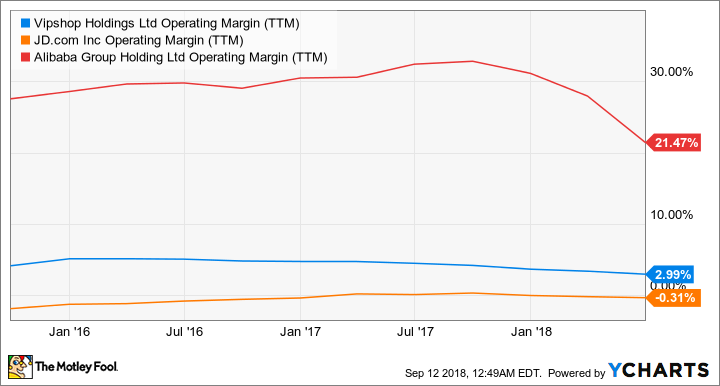Is Vipshop a Buy at Its Multiyear Low?
Shares of Vipshop (NYSE: VIPS) recently tumbled to multiyear lows thanks to concerns about its slowing growth and escalating trade tensions between the US and China. But after that sell-off, Vipshop's stock trades at just 10 times this year's estimated earnings and 0.3 times this year's estimated sales.
Those are incredibly low valuations for a company with double-digit sales growth. Let's take a closer look at how Vipshop lost its mojo, and whether the stock can recover in the near future.

Image source: Getty Images.
What does Vipshop do?
Vipshop runs a B2C (business-to-consumer) marketplace that sells apparel, accessories, and other products through ongoing flash sales. It has a first-mover's advantage but controls only about 2% of China's e-commerce market, according to eMarketer. That puts its in a distant fifth place behind Alibaba (NYSE: BABA), JD.com (NASDAQ: JD), Pinduoduo, and Suning, in that order.
JD.com and Tencent (NASDAQOTH: TCEHY) co-invested $863 million in Vipshop last year to counter Alibaba. That investment gave Tencent a 7% stake, and boosted JD's existing stake from 2.5% to 5.5%. Vipshop subsequently launched about 400 million "mini programs" (in-app stores) on Tencent's WeChat, the top messaging app in China. It also bundled VIP membership packages with Tencent Video subscriptions.
How fast is Vipshop growing?
Vipshop was once a high-growth company, but its year-over-year revenue growth has decelerated over the past year.
Metric | Q2 2017 | Q3 2017 | Q4 2017 | Q1 2018 | Q2 2018 |
|---|---|---|---|---|---|
YOY revenue growth | 30.3% | 27.6% | 27.1% | 24.6% | 18.4% |
YOY = year-over-year. Data source: Vipshop quarterly reports.
Vipshop's growth in number of "active" customers, meaning those who made at least one purchase during the period, also slowed. In the fourth quarter of 2017, Vipshop reported that its active customer number rose 11% annually to 57.8 million for the full year. But in the first quarter of 2018 it stated that its active customer count over the past 12 months grew just 2% annually.
In the second quarter, it quietly swapped the trailing 12 month comparison with a year-over-year comparison. On that basis, its active customer count rose 6% to 29.8 million.
That reporting move raises a red flag. It might initially seem like Vipshop's year-over-year active customer growth accelerated between the first and second quarters, but the two periods used different metrics. Vipshop also didn't report its active customer count on a quarterly basis before, so we can't calculate how many active customers it had on a trailing-12-month basis at the end of the second quarter.

Image source: Getty Images.
Comparing Vipshop's sales growth to its growth in total orders and average revenue per customer (APRU) raises another red flag.
Metric | YOY Growth Q2 2017 | YOY Growth Q3 2017 | YOY Growth Q4 2017 | YOY Growth Q1 2018 | YOY Growth Q2 2018 |
|---|---|---|---|---|---|
Total orders | 23% | 23% | 27% | 25% | 31% |
ARPU | 7% | 11% | 22% | 25% | 12% |
YOY = year-over-year. Data source: ARPU = average revenue per user. Vipshop quarterly reports.
Vipshop's year-over-year growth in total orders has accelerated dramatically, but its revenue and ARPU [average revenue per user] growth have decelerated. This indicates that Vipshop is selling larger quantities of cheaper products -- which reduces its ticket size per customer.
That could be dangerous for Vipshop, because it uses flash sales as a loss leader to sell other products. If customers are only buying flash sale products and ignoring full-price ones, its ARPU will continue to slide as its orders climb and strain its logistics. Vipshop believes that its VIP memberships can offset that slowdown, but it could be a tough uphill battle.
How profitable is Vipshop?
Like JD, Vipshop mostly uses an in-house logistics network instead of relying on third-party delivery services like Alibaba. That's why Vipshop and JD consistently report lower operating margins than Alibaba.
VIPS Operating Margin (TTM) data by YCharts
Vipshop's operating expenses rose 15% annually last quarter, with nearly half of that total being spent on fulfillment services. However, those expenses only used up 18.9% of its revenues during the quarter, compared to 19.5% in the prior-year quarter.
However, Vipshop's decelerating sales are throttling its margins and profits. Its operating margin slid from 3.5% a year earlier to 1.9%, and its non-GAAP net income dropped 14% to 576.9 million RMB ($87.2 million), representing its fourth straight quarter of year-over-year declines.
Metric | YOY Change Q2 2017 | YOY Change Q3 2017 | YOY Change Q4 2017 | YOY Change Q1 2018 | YOY Change Q2 2018 |
|---|---|---|---|---|---|
Non-GAAP net income | 7.5% | (6%) | (8.5%) | (9%) | (14.2%) |
YOY =year-over-year growth. Non-GAAP = adjusted. Data source: Vipshop quarterly reports.
Analysts expect Vipshop's revenue to rise 20% this year, but for its non-GAAP earnings to tumble 17%.
Stick with the market leaders instead
The Chinese e-commerce market is a tough one for smaller players, which lack the brand recognition and scale of market leaders like Alibaba and JD. Vipshop won't fade away anytime soon, but investors should avoid this underdog, pay attention to the red flags, and stick with the market leaders instead.
More From The Motley Fool
Leo Sun owns shares of JD.com and Tencent Holdings. The Motley Fool owns shares of and recommends JD.com and Tencent Holdings. The Motley Fool has a disclosure policy.

 Yahoo Finance
Yahoo Finance 
